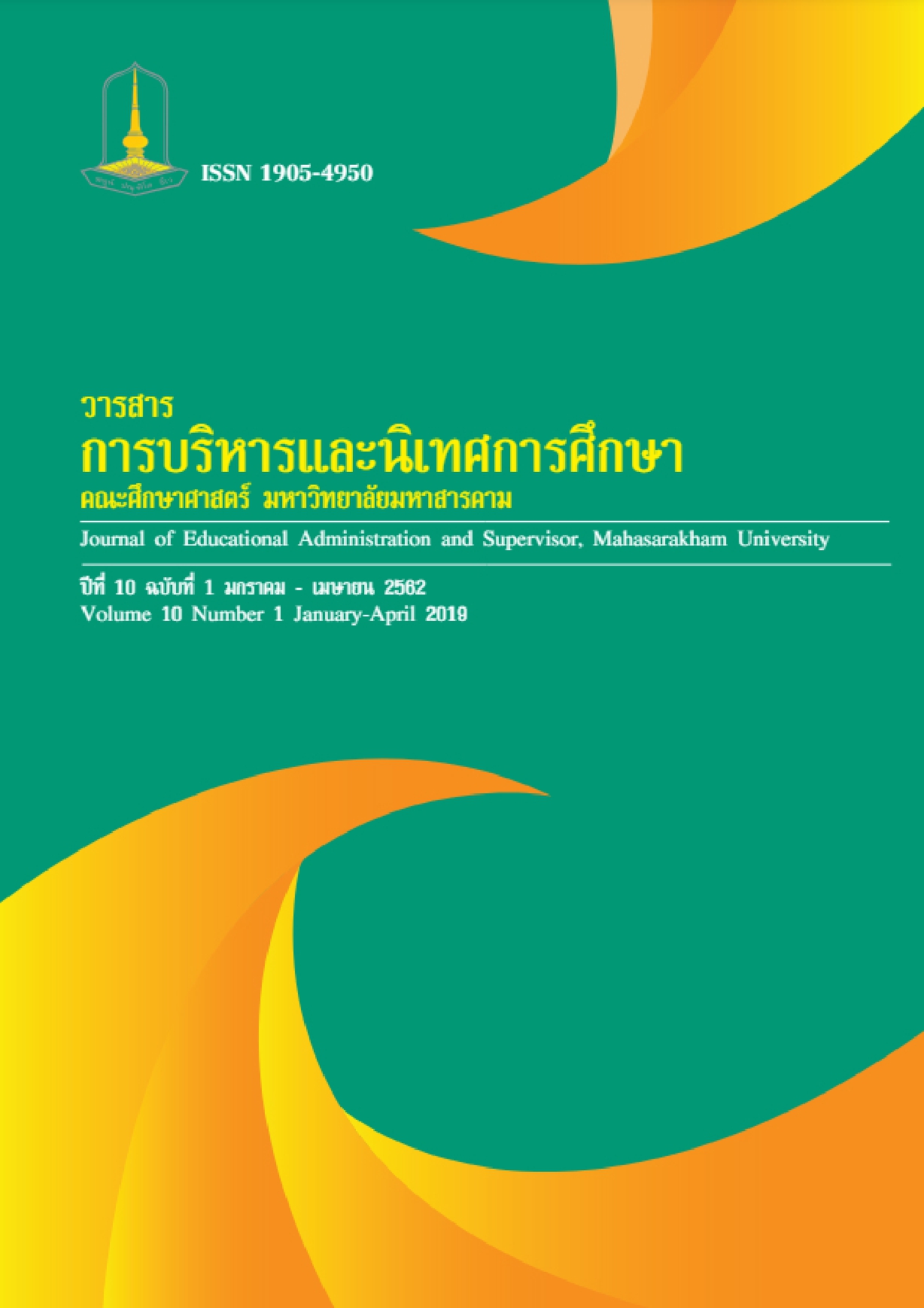Comparison of Learning Achievement Social Studies Subject of the Mathayomsuksa 6 Students, the nature resources-environment crisis and Management subject Using Cooperative Learning “Jigsaw” and Conventional Approach
Main Article Content
Abstract
Comparison of Learning Achievement Social Studies Subject of the Mathayomsuksa 6 Students, the nature resources-environment crisis and Management subject Using Cooperative Learning “Jigsaw” and Conventional Approach. The purposes of this research were: (1) to study The efficiency’s lesson plans Social Studies, Religions and Cultures Subject, the nature resources-environment crisis and Management subject between Cooperative Learning “Jigsaw” and Conventional Approach with the required efficiency of 80/80 (2) to study The Effectiveness Index of Lesson plans Social Studies, Religions and Cultures Subjects, the nature resources-environment crisis and Managements subject between Cooperative Learning “Jigsaw” and Conventional Approach. (3) to compare learning achievements, Department of Social Studies, Religions and Cultures, the nature resources-environment crisis and Managements subjects between Cooperative Learning “Jigsaw” and Conventional Approach. (4) to compare satisfaction students, Social Studies, Religions and Cultures Subject, the nature resources-environment crisis and Managements subject between Cooperative Learning “Jigsaw” and Conventional Approach. Mahasarakham University Demonstration School (Secondary) in the first semester of the academic year 2017, selected through the purposive sampling technique. The instruments were: plans for learning activities using of the two mentioned approaches, each plan lasts 2 hour a week for the total of 8 hours of teaching; a 40-item achievement test with discrimination ranging 0.25-0.89 and a reliability of 0.89; and a 15-item rating-scale questionnaire on satisfactions social subject learning with discrimination ranging 0.22-0.65 and reliability of 0.84.
The results of the study were as follows:
1. The plans of learning management using the Cooperative Learning “Jigsaw” and Conventional Approach of Mathayomsuksa 6 had efficiencies of 86.34/85.86 and 83.44/82.22 respectively.
2. The effectiveness indices of plans of learning management by using the Cooperative Learning “Jigsaw” and Conventional Approach, were 0.7020 and 0.6371 respectively.
3. The students in both Cooperative Learning “Jigsaw” class and the Conventional Approach class gains higher score of Learning achievement, social studies than before at the level of significance .05
4. The students in both Cooperative Learning “Jigsaw” class and the Conventional Approach class gains higher score of satisfaction questionnaire, social studies subject than before
Downloads
Article Details
References
กระทรวงศึกษาธิการ. (2552). หลักสูตรแกนกลางการศึกษาขั้นพื้นฐาน พุทธศักราช 2551. กรุงเทพฯ: ม.ป.พ.
ธารสุธา กุศลเฉลิมวิทย์. (2556). การพัฒนาการเรียนรู้ เรื่อง เศรษฐกิจประเทศไทย โดยใช้วิธีการจัดการเรียนรู้แบบร่วมมือเทคนิคจิ๊กซอว์ กลุ่มสาระการเรียนรู้สังคมศึกษา ศาสนาและวัฒนธรรม ชั้นมัธยมศึกษาปีที่ 1. วารสารบัณฑิตศึกษา, 10(48): 153-160 ; พฤษภาคม-มิถุนายน.
น้ำทิพย์ นาที. (2556). การเปรียบเทียบผลสัมฤทธิ์ทางการเรียนการ การคิดวิเคราะห์และแรงจูงใจใฝ่สัมฤทธิ์ของนักเรียนชั้นมัธยมศึกษาปีที่ 3 ระหว่างการจัดกิจกรรมการเรียนรู้แบบ Jigsaw และการประยุกต์ใช้ทฤษฎีพหุปัญญา สาระภูมิศาสตร์. วิทยานิพนธ์ กศ.ม. มหาสารคาม: มหาวิทยาลัยมหาสารคาม.
รำไพ ชนะจอก. (2556). การพัฒนากิจกรรมการเรียนรู้แบบกลุ่มร่วมมือ เทคนิคจิ๊กซอว์(Jigsaw) กลุ่มสาระการเรียนรู้สังคมศึกษา ศาสนาและวัฒนธรรม ชั้นมัธยมศึกษาปีที่ 3 เรื่อง การสร้างภูมิปัญญาและวัฒนธรรมไทย สมัยรัตนโกสินทร์ ที่มีผลต่อการพัฒนาชาติไทย. การศึกษาค้นคว้าอิสระ กศ.ม. มหาสารคาม: มหาวิทยาลัยมหาสารคาม.
วนิดา ชมภูพงษ์. (2555). ผลการใช้ชุดการเรียนแบบร่วมมือด้วยเทคนิคจิ๊กซอว์เรื่อง ภูมิศาสตร์ประเทศไทยที่มีต่อผลสัมฤทธิ์ทางการเรียนของนักเรียนชั้นมัธยมศึกษาปีที่ 1 โรงเรียนเทศบาล 4 (เชาวนปรีชาอุทิศ). การศึกษาค้นคว้าอิสระ ศษ.ม. นครปฐม: มหาวิทยาลัยศิลปากร. วิมลรัตน์ สุนทรโรจน์. (2558). นวัตกรรมตามแนวคิดแบบ Backward Design. มหาสารคาม: สารคามการพิมพ์.
ศิริธร เชาวน์ชื่น. (2556). การพัฒนาการจัดกิจกรรมการเรียนรู้แบบกลุ่มร่วมมือเทคนิคจิ๊กซอว์ (Jigsaw) กลุ่มสาระการเรียนรู้สังคมศึกษา ศาสนาและวัฒนธรรม เรื่อง อาณาจักรสุโขทัย ชั้นประถม ศึกษาปีที่ 4. การศึกษาค้นคว้าอิสระ กศ.ม. มหาสารคาม: มหาวิทยาลัยมหาสารคาม.
เศวตกนิษฐ์ ศรีสนาย. (2552). การพัฒนาแผนการจัดการเรียนรู้แบบร่วมมือโดยใช้เทคนิค Jigsaw สาระประวัติศาสตร์ ชั้นมัธยมศึกษาปีที่ 3. การศึกษาค้นคว้าอิสระ กศ.ม. มหาสารคาม: มหาวิทยาลัยมหาสารคาม.
สาขาวิชาศึกษาศาสตร์ มหาวิทยาลัยสุโขทัยธรรมาธิราช. (2547). เอกสารการสอนชุดวิชาการสอนสังคมศึกษา 22431 หน่วยที่ 1-7. นนทบุรี: ศูนย์หนังสือมหาวิทยาลัยสุโขทัยธรรมาธิราช.
สุคนธ์ สินธพานนท์ และคณะ. (2555). พัฒนาทักษะการคิดตามแนวปฏิรูปการศึกษา. กรุงเทพฯ: 9119 เทคนิคพริ้นติ้ง.
สุนทร โคตรบรรเทา. (2544). รวมบทความและงานเขียน ศาสตราจารย์ ดร.สาโรช บัวศรี การศึกษาปรัชญาการศึกษา ประชาธิปไตย และจริยธรรม. กรุงเทพฯ: สุวีริยาสาส์น.


